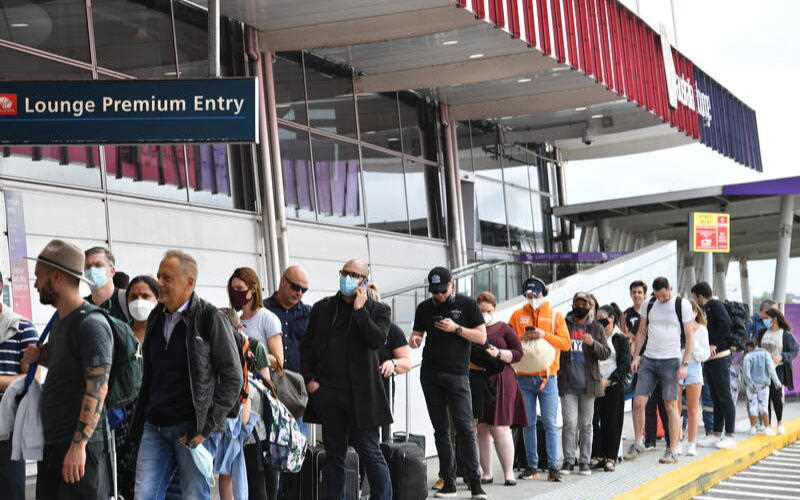The Qantas board has gifted themselves and chief executive Alan Joyce handsome pay rises despite trashing customers, staff and the reputation of the national carrier. Michael Sainsbury analyses Qantas’ bonus scheme.
They socialised the losses – and now they are about to privatise the profits. The eight-member Qantas board has gifted itself a collective 5% pay rise of a collective $2.4 million, including two retiring members who are not being replaced. This has added insult to the injury of tens of thousands of its customers, many of whom have struggled in recent weeks to get back from Asia after being stranded by multiple Jetstar cancellations and to workers being offered a pay rise of 6% over five years (1.2% each year).
The company’s chairman Richard Goyder last year earned $658,000 (including post employment benefits) for his part-time job. This is now more than his 2019 financial year earnings of $584,000. It also makes him the highest paid Qantas director ever, besting his predecessor Leigh Clifford’s $654,000 in his final full year as chairman in 2018-2019. Goyder also chairs energy giant Woodside, currently absorbing its purchase of BHP’s petroleum assets and the Australian Football League, which has just completed a $4.5 billion broadcast and digital rights deal and is searching for a new chief executive.
Profit amid chaos
The Qantas board has a $3 million total to pay itself and with its numbers trimmed from 11 in 2019 to only eight, there is plenty of scope for continuing increase in coming years without troubling shareholders for a raise.
The board has also approved a scheme that will see Qantas chief executive Alan Joyce earn a bonus of at least $3.5 million for the 2021-22 financial year, bringing his total package for last year to $8.7 million, under a special bonus scheme. That will be put to a shareholder vote at the airline’s November 4 annual general meeting.
That’s valuing shares conservatively at their $4.66 valuation used in the board’s calculation price. Even if, per chance, If shareholders vote down Joyce’s participation in the Recovery and Retention Plan (RPP), he will get the cash equivalent instead. With the share price now at $5.23 after a $400 million share buyback was announced, and $7 million in long-term incentives available to Joyce in the current financial year, he looks set to top that figure this financial year.
“The retention bonus in place for next year is key to keeping the considerable talent we have, and it depends on delivering the recovery in full,” Goyder said in interviews last week where he backed Joyce in the face of mounting customer, union and public criticism of the chaos at the airlines.
Joyce’s FY2022 package outstrips his package in pre-Covid 2019 financial year of $6.97m, despite the unprecedented chaos at the company that is inflicting significant damage on its once gold-plated brand.
The Qantas annual report lists Joyce’s base salary as $2.17m and his statutory pay package for 2022 as being worth $5.5 million, including shares that vest under the company’s long term bonus scheme. The company’s top six executives earned a collective $13.9 million.
Winged again: latest chapter of Alan Joyce’s ruinous reign at Qantas laid bare
The devil is in the detail. The Qantas public relations team made much of the fact that executives had not received any annual bonus, under the company’s Short Term Incentive Plan (STIP). True enough, technically.
Thousands of the airline’s most senior staff were put on an RRP for the 2021-2022 year, after much to-ing and fro-ing from the board after it was flagged in September 2021. This effectively replaced the STIP for the year. While that program was technically in place, it was cancelled for the year. The RRP is a $200 million scheme that hands out 43m rights to Qantas shares to the lucky participants once three hurdles are met by June 30, 2023. The STIP is back in play for the current 2023 financial year.
Unlike the company’s regular annual bonus scheme, where hurdles include customer service and aircraft reliability targets, the RRP rights vest if three purely financial hurdles are met. Qantas’ senior executive’s long term bonus (Long Term Incentive Performance Plan) is also based purely on financial hurdles. It measures, equally, the Qantas share price relative to the ASX100 companies and to a group of 12 global airline peer companies.
For the RPP the Qantas Group must:
- Meet its three-year $1 billion recovery program target by June 30, 2023.
- Have net debt below the top end of the net debt range, as approved by the board “in accordance with the Group’s Financial Framework”.
- Be profitable on an underlying basis for 2022-23.
Still, the board retains discretion to “adjust the net debt range upwards to take into consideration significant initiatives or strategic proposals undertaken by the Qantas Group that have impacted the ability to deliver the Net Debt target.”
For Joyce, this means 698,000 rights, as revealed in the Qantas AGM notice of meeting. Shareholder advisers told MWM that the cost-cutting program was close to completion, net debt was in the right range, helped along by the sale of land and building worth $800 million at Mascot. Qantas management has told the market that it expects to post a profit in the current financial year which means all hurdles will be met.
It’s true that Joyce did not take home $8.7 million last year. Indeed for the past three years (FY20-22) he has collected only his base salary, now back to $2.17m a year. In what is clearly an effort for better “optics” he has deferred share rights due to him under the company’s Long Term Incentive Plan until “at least August 2023.” It is those, along with non-cash benefits such as air travel, that are added to his base salary to get his statutory salary package. Joyce has 1.03 million deferred shares, totalling $5.39 million at today’s share price. Another 1,349,000 will be on offer if hurdles are hit in the current financial year – a value of $7.1 million at today’s share price.
As a kicker, his existing 2,990,243 shares in Qantas, earned through various bonus schemes over the years, increased in value by $2.3 million in the 2022 financial year. The share price received a further boost after the company announced in July it would buy back $440 million in shares instead of better compensating staff.
Goyder’s new pay packet compares to his pre-Covid earnings in the 2018-19 financial year of $584,000 meaning his earnings have increased 12.7% in a period where Qantas staff have seen a two-year pay freeze and an ongoing offer of 2% for three years – an average yearly rise of 1.2% and a comparable three-year rise, compared to the chairman’s average of 3.6% a year. Qantas is still negotiating enterprise agreements with more than half of its employees.
The Qantas annual report stated that fees are benchmarked against non-executive director fees of ASX50 companies and revenue based peer groups.
“Consistent with the Group-wide wage freeze, Non-Executive Director fees remained unchanged in 2021/22,” the report said. “Non-Executive Directors remuneration for 2021/22 is higher than in prior years, as Non-Executive Directors returned to receiving contracted Board Fees after voluntarily reduced pay for seven months during the last two financial years.”
‘Modern day pirates’
Transport Workers Union federal secretary Michael Kaine told MWM that Qantas:
is being run by modern day pirates swindling the Australian public out of billions in taxpayer welfare and charging customers premium airfares for a decimated, top-heavy airline
Kaine continues: “These are the darkest days of Qantas yet the board and CEO are cashing in on the misery they have inflicted upon workers and passengers. For the Australian public clinging to the last shred of faith they had in Qantas, this will surely be the nail in the coffin. The report backs up what workers have been blowing the whistle on for years: Joyce-led Qantas has churned out deliberate tactics to slash jobs and freeze wages to line their own pockets with no concern for the impact to safety or service.
“It is now harder than ever for workers to make a decent living at airports because of illegal outsourcing, fragmentation and wage suppression under Joyce’s leadership. The chasm between exorbitant executive pay packets and workers struggling to make ends meet is only going to worsen airport chaos as more essential workers leave the industry.
“There is no clearer evidence of the need for oversight and regulation in aviation through a commission that can set appropriate standards for safety and service, prioritise good, secure jobs, and cap executive pay to rein in the corporate greed at Qantas that has destroyed this industry.”
Still, after being run purely based on financial metrics – for shareholders and not customers or staff – for the past three years, the board has at least set a new STIP Scorecard for 2022-23. “Acknowledging our need to do more to deliver the service our customers expect, the STIP Scorecard will have an increased weighting to Customer, and prioritise a combination of key operational measures like punctuality and reliability of our airlines, customer satisfaction (measured in NPS) and the Group’s reputation and trust, to align Executive incentive outcomes to our customers’ experience,” the annual report said.
Let’s hope it’s not too late. But whatever happens, the upside for Joyce is huge. Meanwhile, amid the jokes about longer queues at Qantas than Buckingham Palace, the latest slight to customers has been to cut vegetarian meal options – just another little measure to help the Board achieve its bonuses.
Rooing the day: Qantas passengers and crew taken for a ride by the board
Michael Sainsbury is a former China correspondent who has lived and worked across North, Southeast and South Asia for 11 years. Now based in regional Australia, he has more than 25 years’ experience writing about business, politics and human rights in Australia and the Indo-Pacific. He has worked for News Corp, Fairfax, Nikkei and a range of independent media outlets and has won multiple awards in Australia and Asia for his reporting. He is a fierce believer in the importance of independent media.

